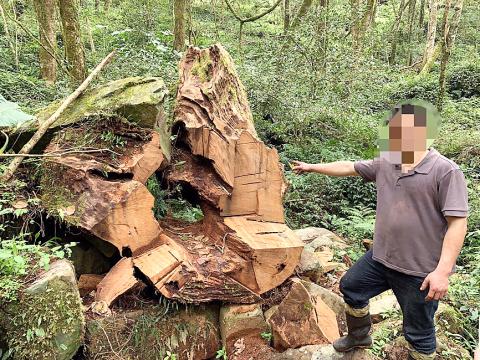The number of illegal logging cases last year dropped to an eight-year low, but forested areas in the central and eastern parts of Taiwan proper are still frequented by unlicensed loggers, or “mountain rats,” the Forestry Bureau said yesterday.
The cases dropped from 370 in 2011 to 157 last year, which could be attributed to the bureau’s increasing cooperation with judicial and law-enforcement agencies since 2010, as well as amendments passed in 2015 to the Forestry Act (森林法), which increased penalties for illegal loggers, it said.
Data on areas frequented by illegal loggers and their top targets were released ahead of the International Day of Forests today, when the bureau is to hold its annual ceremony recognizing outstanding forest rangers.

Photo courtesy of the Hsinchu County Police Bureau’s Hengshan Precinct
Documentation about precious trees used to be classified as confidential information, but the bureau opened it to the public so that more people can help protect national forests, which cover about 1.62 million hectares, it said.
From 2011 to last year, 65 percent of the illegal logging cases involved theft of tree stumps left by logging activities from the Japanese colonial era until the 1980s, with Taiwan red cypress, Taiwan yellow cedar and Taiwan incense cedar the most frequent targets because of their special texture and aroma, the bureau said.
Stumps are easier to cut and transport, which makes them more attractive to illegal loggers, who often operate near the Beiyi Highway in Yilan County and the Northern Cross-Island Highway connecting Yilan and Taoyuan, as well as mountainous areas of Miaoli, Hsinchu, Nantou and Chiayi counties, including the Alishan area, it said.
Cutting standing trees accounted for just 12 percent of the cases, with stout camphor trees and Formosan China firs being the main targets, while other cases involved precious forest by-products (11 percent), precious driftwood (9 percent) and excavation of special garden tree species (3 percent), it said.
There are always “bigger rats” behind the mountain rats, who collect and sell the timber, the bureau said, urging people to reject wood products from unknown sources to help stop illegal logging.

Taiwan is stepping up plans to create self-sufficient supply chains for combat drones and increase foreign orders from the US to counter China’s numerical superiority, a defense official said on Saturday. Commenting on condition of anonymity, the official said the nation’s armed forces are in agreement with US Admiral Samuel Paparo’s assessment that Taiwan’s military must be prepared to turn the nation’s waters into a “hellscape” for the Chinese People’s Liberation Army (PLA). Paparo, the commander of the US Indo-Pacific Command, reiterated the concept during a Congressional hearing in Washington on Wednesday. He first coined the term in a security conference last

Prosecutors today declined to say who was questioned regarding alleged forgery on petitions to recall Democratic Progressive Party (DPP) legislators, after Chinese-language media earlier reported that members of the Chinese Nationalist Party (KMT) Youth League were brought in for questioning. The Ministry of Justice Investigation Bureau confirmed that two people had been questioned, but did not disclose any further information about the ongoing investigation. KMT Youth League members Lee Hsiao-liang (李孝亮) and Liu Szu-yin (劉思吟) — who are leading the effort to recall DPP caucus chief executive Rosalia Wu (吳思瑤) and Legislator Wu Pei-yi (吳沛憶) — both posted on Facebook saying: “I

The Ministry of Economic Affairs has fined Taobao NT$1.2 million (US$36,912) for advertisements that exceed its approved business scope, requiring the Chinese e-commerce platform to make corrections in the first half of this year or its license may be revoked. Lawmakers have called for stricter enforcement of Chinese e-commerce platforms and measures to prevent China from laundering its goods through Taiwan in response to US President Donald Trump’s heavy tariffs on China. The Legislative Yuan’s Finance Committee met today to discuss policies to prevent China from dumping goods in Taiwan, inviting government agencies to report. Democratic Progressive Party Legislator Kuo Kuo-wen (郭國文) said

Sung Chien-liang (宋建樑), who led efforts to recall Democratic Progressive Party (DPP) Legislator Lee Kun-cheng (李坤城), was released on bail of NT$80,000 today amid outcry over his decision to wear a Nazi armband to questioning the night before. Sung arrived at the New Taipei District Prosecutors’ Office for questioning in a recall petition forgery case last night wearing a red armband bearing a swastika, carrying a copy of Adolf Hitler’s Mein Kampf and giving a Nazi salute. Sung left the building at 1:15am without the armband and covering the book with his coat. Lee said today that this is a serious